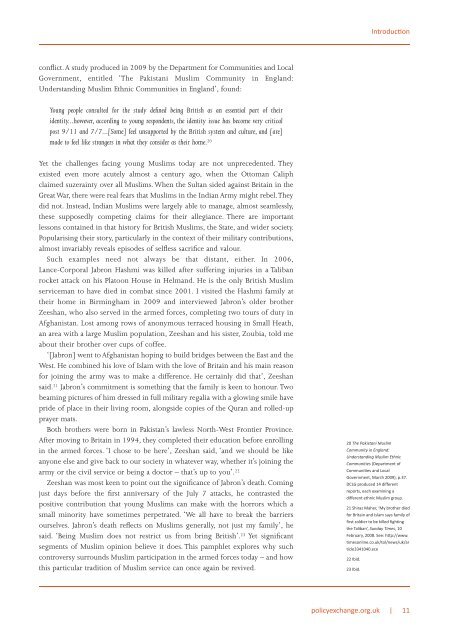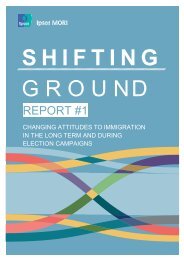Create successful ePaper yourself
Turn your PDF publications into a flip-book with our unique Google optimized e-Paper software.
conflict.A study produced in 2009 by the Department for Communi<strong>ties</strong> and Local<br />
Government, entitled ‘The Pakistani Muslim Community in England:<br />
Understanding Muslim Ethnic Communi<strong>ties</strong> in England’, found:<br />
Young people consulted for the study defined being British as an essential part of their<br />
identity...however, according to young respondents, the identity issue has become very critical<br />
post 9/<strong>11</strong> and 7/7...[Some] feel unsupported by the British system and culture, and [are]<br />
made to feel like strangers in what they consider as their home. 20<br />
Yet the challenges facing young Muslims today are not unprecedented. They<br />
existed even more acutely almost a century ago, when the Ottoman Caliph<br />
claimed suzerainty over all Muslims. When the Sultan sided against Britain in the<br />
Great War, there were real fears <strong>that</strong> Muslims in the Indian Army might rebel.They<br />
did not. Instead, Indian Muslims were largely able to manage, almost seamlessly,<br />
these supposedly competing claims for their allegiance. There are important<br />
lessons contained in <strong>that</strong> history for British Muslims, the State, and wider society.<br />
Popularising their story, particularly in the context of their military contributions,<br />
almost invariably reveals episodes of selfless sacrifice and valour.<br />
Such examples need not always be <strong>that</strong> distant, either. In 2006,<br />
Lance-Corporal Jabron Hashmi was killed after suffering injuries in a Taliban<br />
rocket attack on his Platoon House in Helmand. He is the only British Muslim<br />
serviceman to have died in combat since 2001. I visited the Hashmi family at<br />
their home in Birmingham in 2009 and interviewed Jabron’s older brother<br />
Zeeshan, who also served in the armed forces, completing two tours of duty in<br />
Afghanistan. Lost among rows of anonymous terraced housing in Small Heath,<br />
an area with a large Muslim population, Zeeshan and his sister, Zoubia, told me<br />
about their brother over cups of coffee.<br />
‘[Jabron] went to Afghanistan hoping to build bridges between the East and the<br />
West. He combined his love of Islam with the love of Britain and his main reason<br />
for joining the army was to make a difference. He certainly did <strong>that</strong>’, Zeeshan<br />
said. 21 Jabron’s commitment is something <strong>that</strong> the family is keen to honour. Two<br />
beaming pictures of him dressed in full military regalia with a glowing smile have<br />
pride of place in their living room, alongside copies of the Quran and rolled-up<br />
prayer mats.<br />
Both brothers were born in Pakistan’s lawless North-West Frontier Province.<br />
After moving to Britain in 1994, they completed their education before enrolling<br />
in the armed forces. ‘I chose to be here’, Zeeshan said, ‘and we should be like<br />
anyone else and give back to our society in whatever way, whether it’s joining the<br />
army or the civil service or being a doctor – <strong>that</strong>’s up to you’. 22<br />
Zeeshan was most keen to point out the significance of Jabron’s death. Coming<br />
just days before the first anniversary of the July 7 attacks, he contrasted the<br />
positive contribution <strong>that</strong> young Muslims can make with the horrors which a<br />
small minority have sometimes perpetrated. ‘We all have to break the barriers<br />
ourselves. Jabron’s death reflects on Muslims generally, not just my family’, he<br />
said. ‘Being Muslim does not restrict us from bring British’. 23 Yet significant<br />
segments of Muslim opinion believe it does. This pamphlet explores why such<br />
controversy surrounds Muslim participation in the armed forces today – and how<br />
this particular tradition of Muslim service can once again be revived.<br />
Introduc�on<br />
20 The Pakistani Muslim<br />
Community in England:<br />
Understanding Muslim Ethnic<br />
Communi<strong>ties</strong> (Department of<br />
Communi<strong>ties</strong> and Local<br />
Government, March 2009), p.37.<br />
DCLG produced 14 different<br />
reports, each examining a<br />
different ethnic Muslim group.<br />
21 Shiraz Maher, ‘My brother died<br />
for Britain and Islam says family of<br />
first soldier to be killed fighting<br />
the Taliban’, Sunday Times, 10<br />
February, 2008. See: http://www.<br />
timesonline.co.uk/tol/news/uk/ar<br />
ticle3341040.ece<br />
22 Ibid.<br />
23 Ibid.<br />
policyexchange.org.uk | <strong>11</strong>



